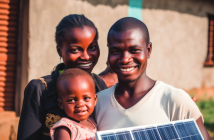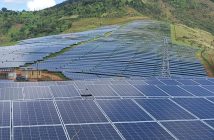- South Africa: two important AGMs are taking place in Jhb next week. The first is that of Sasol Limited on Wednesday, 27 November; and the second is that of FirstRand Limited on Thursday, 28 November.
- Both companies are under the cosh regarding their carbon footprint and investment policy from shareholders, institutional investors and the broader public at large.
Sasol Limited
The Sasol AGM will be held from 10h00 on Wed, 27 Nov 2019 at The Forum, The Campus, Wanderers Building, 57 Sloane Street, Bryanston, Jhb. See Sasol’s Notice of AGM here.
Brief background
Despite being SA’s second-largest emitter of greenhouse gases (GHG), Sasol’s board recently rejected the tabling of a shareholder resolution by a group of six institutional investors. The institutions — Old Mutual, Sanlam Investment Managers, Coronation, Abax, Aeon Investment Management and Mergence Investment Managers — had asked for greater transparency from Sasol on how its long-term GHG emission reduction strategy, and executive rewards, align with the Paris accord on climate change.
This is the second consecutive year in which Sasol has rejected a shareholder resolution asking for more disclosure on its climate change mitigation strategy. In 2018, the request came from the Raith Foundation and shareholder activist Theo Botha with support from Just Share. The 2018 resolution was rejected on the basis of a legal opinion which Sasol refused to share; and the board’s commitment that Sasol would provide the requested information in its 2019 climate change report.
That report was released, along with its annual results, last month. While it represents progress, the report did not fully live up to Sasol’s 2018 commitments. Neither did it fully meet shareholders’ expectations. (See Just Share’s preliminary comments on Sasol’s Climate Change Report for more.)
Sasol investors and civil society activists will be attending the fossil fuel producer’s AGM on 27 Nov to further engage with Sasol’s board on these critical issues.
FirstRand Limited
The FirstRand AGM will be held from 09h00 on Thur, 28 Nov at the Auditorium, FNB Conference and Learning Centre, 114 Grayston Drive, Sandton, Jhb. See FNB’s Notice of AGM here.
Background
At the FirstRand AGM, shareholders will vote on the second set of climate risk-related shareholder resolutions ever to be tabled in South Africa. The resolutions were proposed by the RAITH Foundation and shareholder activist non-profit Just Share NPC. The resolutions (set out in full in FirstRand’s 2019 Notice of Annual General Meeting) request the following:
Ordinary resolution number 5: FirstRand should prepare a consolidated report to shareholders, by no later than end October 2020, at reasonable cost and omitting proprietary information, on its assessment of its exposure to climate-related risks (transition and physical) in its lending, investing and financing activities, including:
- The amount and percentage of fossil fuel-related assets relative to total assets;
- A description of any significant concentrations of credit exposure to fossil fuel-related assets; and
- The amount of lending and other financing connected with climate-related opportunities.
Ordinary resolution number 6: FirstRand should adopt and publicly disclose on its website, by no later than end October 2020, a policy on lending to fossil fuel-related projects, including coal-fired power plants, coal mining operations and oil and gas exploration and production projects.
The FirstRand board has endorsed ordinary resolution number 6, stating that it “has a policy on thermal coal financing” and that it is “in the process of developing a policy for its oil and gas financing, which will be publicly available in the next 12 months”.
However, the FirstRand board has not endorsed ordinary resolution number 5 (“Resolution 5”). The note below provides FirstRand shareholders with further context to this resolution, responds to the board’s “reasons for non-endorsement”, and gives further reasons for voting in favour of Resolution 5.
Context: why did RAITH and Just Share propose these resolutions?
Climate change is already affecting millions of people around the world. Every day we see further warnings of imminent catastrophe. Earlier this month, more than 11 000 scientists published a joint statement in the journal BioScience, warning that humanity faces “untold suffering due to the climate crisis” unless there are major transformations to global society. However, as the scientists also point out, “[d]espite 40 years of global climate negotiations, with few exceptions, we have generally conducted business as usual and have largely failed to address this predicament”.
Urgent carbon reduction is one of the key global transformations required, and this means that we must “quickly implement massive energy efficiency and conservation practices, replace fossil fuels with low carbon renewables and other cleaner sources of energy … and leave remaining stocks of fossil fuels in the ground”.
Banks’ financing choices have a major role to play in promoting carbon reduction. Bank lending and investments make up a significant source of external capital for carbon intensive industries. Every rand invested by South African banks in new fossil fuels increases climate risk, renders it harder to achieve a just transition to a low-carbon economy, and exposes the banks to reputational and financial risks.
From a shareholder perspective, climate risk poses a material financial risk to many classes of investments in the short, medium and long term. Institutional investors, and particularly pension funds, have a fiduciary duty to consider these risks in their investment decision-making, and to actively engage with the management of companies whose activities are exacerbating the climate emergency. Considered voting on shareholder resolutions is an important way to exercise active ownership.
Shareholders should be able to assess the extent to which FirstRand is exposed to climate risk by virtue of its lending, investment and financing activities. However, the information currently disclosed by the company is insufficient to enable shareholders to adequately assess these risks.
Response to FirstRand’s non-endorsement of Resolution 5
The FirstRand board states that it “fully agrees with the need for a consolidated report on the group’s assessment of its exposure to climate-related risks (transition and physical) in its lending, investing and financing activities. However, the requisite deadline of October 2020 presents an unattainable time frame for the group”. The board then explains the steps it is taking towards better climate risk disclosure, and why, in its view, a year is insufficient time for it to provide the information requested by the resolution.
While the proposing shareholders are mindful that the disclosure requested requires FirstRand to develop internal procedures for data gathering and climate risk reporting, the board’s response lacks any recognition of the urgency of the situation that we face. The reason why climate risk shareholder resolutions are being proposed around the world is precisely because the leaders of carbon intensive companies and the financial institutions which fund them have simply not reacted fast or strongly enough to the emergency.
It is essential for shareholders to use this resolution to send a signal to FirstRand, and to the rest of the South African financial sector, that climate risk is an emergency which must be treated with appropriate urgency. Providing management with excessive flexibility on time frames will simply delay disclosure, and therefore delay the action that shareholders and management must take on the basis of that disclosure.
Climate risks “are a function of cumulative emissions”, in other words, the longer we leave it to act, the more costly will be the adjustment we have to make. Financial institutions will put both their businesses and shareholder capital at risk if they fail to grasp the pace of change that is required in order to move to a low carbon economy.
The Recommendations of the Task-Force on Climate-Related Financial Disclosures (TCFD) provide guidance for climate-related financial disclosures by financial institutions, and many banks around the world are already providing this information to shareholders. Climate risk disclosure is an evolving process, but it is necessary to start somewhere. The rationale behind the Recommendations is not to wait until an organisation is in a position to provide a perfect set of disclosures, but rather to be transparent about the climate risks and opportunities facing it, and about what it is doing to address them.
Voting in favour of Resolution 5 will not only provide FirstRand’s shareholders with much more meaningful information on climate risk than is currently being disclosed; it will also mean that shareholders will set a precedent which will accelerate the pace at which South African companies consider, disclose and manage climate-related risks and opportunities.
Author: Bryan Groenendaal











